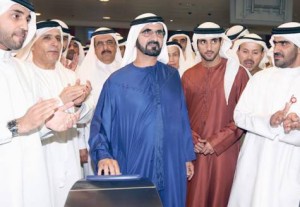By Samir Salama, Associate Editor www.gulfnews.com
An astute statesman and a visionary leader who wants the UAE to be number one in everything: education, health and housing.

Part of His Highness Shaikh Mohammad Bin Rashid Al Maktoum, Vice-President and Prime Minister of the UAE and Ruler of Dubai’s value system is all about changing people’s lives for the better through smart capitalism, willpower and positive energy.
Since the accession of Shaikh Mohammad on January 4, 2006, the entire concept of governance has changed in the UAE through his inspired leadership and judicious guidance.
“Shaikh Mohammad is a great leader, whose ambitions have no limit,” said Dr Ebtisam Al Kitbi, professor of political science at the UAE University.
Through his discipline, result-oriented work, consistent performance, Shaikh Mohammad led the Cabinet to implementing the directives of President His Highness Shaikh Khalifa Bin Zayed Al Nahyan and towards making the UAE an international brand, synonymous with success and good governance, Dr Al Kitbi added.
Great progress
Commemorating the fifth anniversary of Shaikh Mohammad’s accession as Ruler of Dubai and then as Vice-President and Prime Minister of the UAE, Gulf News looks back at the successes of the Federal Government under his leadership towards developing a knowledge-based economy in the Arab world and beyond. Social development can be gauged by assessing progress in education, health care, population and work force, culture, youth and communities.
Today, universities and educational institutes are spread all over the country, whereas in 1977 there was only one university. The Ministry of Higher Education and Scientific Research has accredited 64 universities and higher education institutes for the 2009-10 academic year. Great progress has been made in education in the past few years. The Federal Government has concentrated on the fact that education represents an important element in human development. The number of public schools has shot up from 1,256 with more than 600,000 students in 2007-08 to more than 1,350 public schools, with over 700,000 students in 2008-09.
Education has been of particular focus of the Federal Government over the past four years. Policies focused on putting students first and ensuring high quality education in both public and private schools by instituting a system of inspections and accreditation.
Ministry of Health statistics reveal that government hospitals shot up to 40 in 2009 from 33 in 2006. There are also 115 primary health-care centres in the UAE, including 14 hospitals administered by the Ministry of Health, 67 health centres and 11 primary school health centres. Health services were allocated in 2009 more than Dh2.6 billion. In the past five years the Federal Government adopted a number of initiatives aimed at organising the labour market in a way that protects both workers and employers, in addition to providing a decent living to all.
Examples include reforms of the sponsorship system, which allow an employee to switch jobs after two years without the requirement of a no-objection certificate and without facing a six-month work ban. Unified standards for labourers’ accommodation were also introduced. In 2009, amendments were introduced to upgrade the standards of labour accommodation to the benefit of workers.
The Wage Protection System was established by ministerial decree No 988 for 2008 due to the Ministry of Labour’s awareness of the importance of wages in defining the relationship between employers and workers.
















